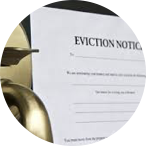D.C. Tenant-Landlord Law

Fair Housing
The Fair Housing Act was created in order to ensure that everyone is treated equally during the housing process. It protects tenants from discrimination when seraching for a rental property. At the federal level the Fair Housing Act protects the following classes…
- Race
- Color
- National Origin
- Religion
- Sex
- Familial Status
- Disability
Learn about fair housing at the federal level here.
In accordance with the District of Columbia Human Rights Act of 1977 housing providers cannot discriminate on the basis of...
*** Marital status
- Personal appearance
- Sexual orientation
- Gender identity or expression familial status
- Family responsibilities
- Matriculation
- Political affiliation
- Genetic information
- Disability
- Source of income
- Status as a victim of an intrafamily offense
- Place of residence or business**
In addition, sexual harassment is a form of sex discrimination which is prohibited by the act.
(§ 2-1401.01)
Security Deposits
- Landlords may not demand or collect security deposits for rental units occupied upon or before July 17, 1985.
- Landlords may collect security deposits for newly constructed units or units exempted under § 42-3502.05(a)(4) and § 42-3502.05(a)(7) (§ 42–3502.17(a)).
- Security deposits cannot exceed the first full month’s rent and can only be charged once by the owner to the tenant (§§ 308.2).
- The Office of Administrative Hearings may judge tenant’s complaints for the non-return of security deposits and the nonpayment of interest on security deposits (§ 42–3502.17(b)).
- Security deposits cannot be withheld for ordinary wear and tear, including breakage or malfunction due to age or deteriorated condition.
- Security deposits can be withheld for negligence, carelessness, accident, or abuse of the unit (§ 42–3502.17).
Rent and Late Fees
D.C. Law 21-172. Rental Housing Late Fee Fairness Amendment Act of 2016.
To amend the Rental Housing Act of 1985 to limit the amount of a late fee a housing provider may charge a residential tenant for the late payment of rent, to establish a minimum grace period before a late fee may be imposed, to prohibit a housing provider from charging interest on a late fee, deducting any amount of a late fee from a subsequent rent payment, imposing a late fee more than one time on each late payment, evicting a tenant on the basis of the nonpayment of a late fee, or from imposing a late fee on a tenant for the late payment or nonpayment of any portion of the rent for which a rent subsidy provider, rather that the tenant, is responsible for paying, and to establish penalties for violations of these provisions.
Learn more about Law 21-172 here.
- Landlords may charge a late fee of no more than 5% of the full amount rent due by the tenant (§ 42–3505.31(a)).
- Landlords may only charge a late fee:
- If the written lease agreement states the maximum amount of the late fee; and
- If the tenant has not paid the full amount of rent within 5 days, or whatever period is defined in the lease, after the rent due date (§ 42–3505.31(b)).
- Landlords may not:
- Charge interest on a late fee;
- Deduct any amount of a late free from future rent payments;
- Charge more than one late fee per late payment;
- Evict a tenant due to their nonpayment of a late fee;
- Charge a late fee for the late payment or nonpayment of the rent for which a rent subsidy provider, rather that the tenant, is responsible for paying; or
- Charge a late fee during a declared public health emergency (§ 7-2304.01) (§ 42–3505.31(c)).
- After the grace period, a landlord may issue a tenant an invoice for any late fees to be paid within 30 days. If the tenant does not pay within the 30-day period, the landlord may deduct any unpaid late fees from a tenant's security deposit at the end of the tenancy (§ 42–3505.31(d)).
Eviction Laws
The most stressful part of property management is when something goes wrong in such a way as to result in an eviction. There are two main types of evictions:
1. Failure to pay rent - the tenant did not pay you according to the terms of when rent is due.
2. Other lease violation - the tenant did not follow the agreed upon terms in the lease, such as no smoking, no pets, etc.
While we hope these do not happen to you, here are some simple steps to follow. We recommend consulting a local lawyer in advance as well.

Eviction Step #1
Inform your tenant with an official notice
An official notice is posted to the tenant. Typically, although this varies based State and county, the landlord hands the notice to the tenant in person, or posts the notice to the door if the tenant is not home. You also may need to send a copy via certified mail.

Eviction Step #2
Wait for the tenant to respond
When it is failure to pay rent, the tenant has 30 days to pay you otherwise the eviction notice can be filed with the courts.
When there is another lease violation (e.g. subletting), the tenant has 30 days to resolve the violation from the point that the eviction notice is served. Otherwise the eviction notice will be filed with the courts.

Eviction Step #3
File With Court
If the tenant has not paid you within the time period outlined in Step #2, then file with the local courts for the official eviction. Both you and the tenant will receive a specific date for the hearing.

Eviction Step #4
Attend the court date
You or your lawyer will want to attend the court hearing and bring proper documentation of the lease violation with you. You should prepare to bring the following, at a minimum:
- Your lease agreement
- Evidence of payment failures / history
- Proof that you served the tenant (Step #1)
- Any communications or other helpful records

Eviction Step #5
Sheriff to remove the tenant
If the tenant does not leave on their own, then you have a right, within a certain amount of time, to request for a sheriff to remove the tenant.

Eviction Step #6
Collecting damages
Most likely, the tenant owes you money for the lease violation. Here are some ways to collect money from the damages:
- Garnish wages
- File in small claims court
- Use a private debt collector
Early Termination of Lease
When there is not a lease violation, but the landlord or tenant wants to break the lease, the following regulations apply:
Early termination by landlord
If the landlord wishes to terminate the lease early, they have to give a notice period of “Just cause” only, notice period varies with cause. See statute..
Early termination by tenant
If the tenant wishes to terminate the lease early, they have to give a notice period of 30 days.
For more information on Washington DC Landlord Tenant laws please visit their website here.
As the situation with COVID-19 continues to evolve, the moratorium on foreclosures and evictions will continue to impact millions of rental properties across the country. For the most up to date information on this legislation, as well as to see if your city or county has additional directives in place, please contact your local representative.




